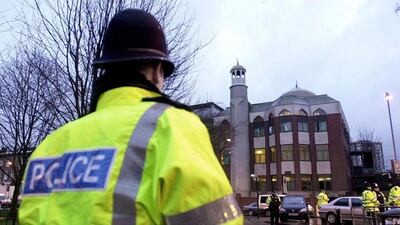Hate crime incidents targeting mosques in the UK between March and July this year more than doubled from last year, according to data obtained from British police.
One hundred and ten such incidents were recorded against Muslim places of worship during this period — up from 47 over the same five months in 2016. ISIL-claimed terror attacks struck Manchester and London in May and June of this year respectively.
Hate crime incidents recorded this year include: smashed windows; damage to vehicles outside mosques; bomb threats made to worshippers; graffiti daubed on buildings; physical assaults on Muslims arriving and leaving; arson attacks; and two incidents of bacon being left outside mosques.
The findings came from responses to Freedom of Information requests that the British Press Association news agency filed to the UK's 45 police forces; all but three forces replied to the requests.
Almost 60 per cent of the forces recorded an upsurge in crimes directed at mosques during the five-month period. The highest increase was seen in Greater Manchester, which recorded nine incidents this year after recording zero last year.
_______________
Read more:
Bradford Muslims sent acid attack threat letters
London hate crime acid attack suspect arrested
UK Muslims face 'extremist threat from the right' as Islamophobia surges
Police begin to question 'troubled' Finsbury Park Mosque attacker
_______________
London’s force, the Metropolitan Police, saw the next highest increase, recording 17 crimes March and July this year, up from eight in the same time period in 2016.
The true number of such attacks could actually be substantially higher than these figures show, however, as different forces have different ways of recording hate crimes.
A home office spokesman said of the findings: “All forms of hate crime are completely unacceptable and the UK has some of the strongest laws in the world to tackle it.”
Shadow home secretary Diane Abbott called the figures “deeply troubling”.
“Attacks on any religious group or minority are abominable," she said. "These anti-Muslim attacks will be condemned by all decent people.”
Fiyaz Mughal, founder of Tell Mama, an organisation that records anti-Muslim incidents in the UK, said: “Political events have supercharged the sense of confidence in sections of our population which probably held those [extremist] views and didn’t voice them before, but felt confident in voicing them over the last few years.”
"We have seen a rise in anti-Muslim extremism and far-right activity online, with a very slow, dinosaur approach from social media companies to take off hate, and an utter denial for three or four years that this was their responsibility," he told the Independent news site.
He also said some in the British Muslim community were refusing to accept that Islamist terrorism had a massive impact on violence against them.
“The biggest driver of anti-Muslim hate is terrorist attacks — the research is very clear here,” Mr Mughal said.
“We need to be honest. Not wanting to acknowledge that terrorism is the biggest driver, and to blame the media instead, is very much an Islamist narrative. We have to reduce terrorist attacks in order to reduce fractures in our community.”
The figures came out as the government announced the creation of a new national online hate crime hub which will allow people to report incidents that take place on social networks such as Twitter and Facebook.
British home secretary Amber Rudd said such crimes “should me met with the full force of the law”.
“The national online hate crime hub that we are funding is an important step to ensure more victims have the confidence to come forward and report the vile abuse to which they are being subjected,” she said.
“The hub will also improve our understanding of the scale and nature of this despicable form of abuse. With the police, we will use this new intelligence to adapt our response so that even more victims are safeguarded and perpetrators punished.”

